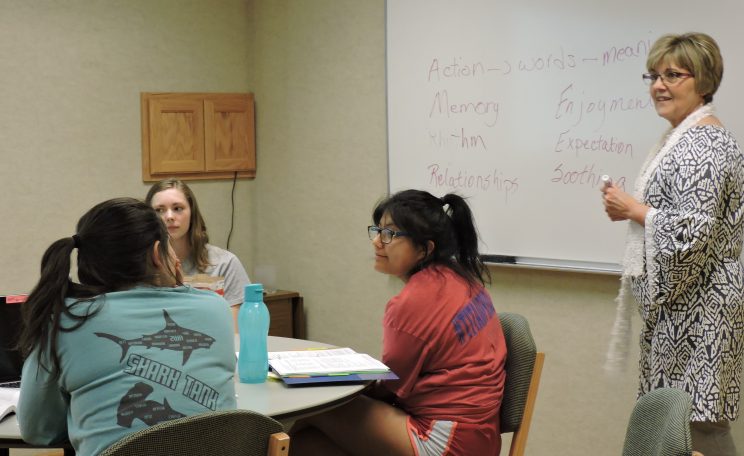The Culture of an Evening Class: a “Different Animal”
By Luke Hertzler – Horizon News & Features Editor
Walking into Psalms and Epistles class on Monday at 6:30 p.m., you will find students playing with Silly Putty and bouncing balls, sitting on desks, and munching on snacks. But they’re also taking notes during brief lectures and engaging in lively group discussion. Aspects of Psalms and Epistles that mix things up include: prayer stations, movies, skits, and debates.
“The culture of an evening class must be different because it must be more participatory, more communal, and more image-based,” says Michele Hershberger, professor of Bible and Ministry.
Psalms and Epistles is one of six classes offered this spring, and the culture of these evening classes varies significantly from regular classes. Evening classes are scheduled later for a variety of reasons: They’re often more accommodating to adjunct professors, non-traditional students and students with day jobs. Some profs choose to teach in the evening because they can teach for longer periods of time and incorporate more hands-on experiences.

One of the unique aspects of evening classes is that it’s open to community members.
“[Community members] come with this whole different perspective,” says Hershberger, “It makes it an intergenerational class…That’s a huge part of the culture.”
But evening classes have their downsides.
“Students have to be engaged with all of their senses or two-and-a-half hours is just too long,” Hershberger said. “I’m always emotionally wiped out after class.”
Tami Keim, professor of Early Childhood Education, also holds evening classes.
“The classes are usually small, so very interactive, which I really like,” Keim said, “Evening classes – you have to be that way.”
Some classes, such as Intro to Film and Orchestra, have taken a hybrid approach where professors require both day and evening class attendance.
Donovan Tann, professor of Intro to Film, says evening class requires something a little different than day class.
“It demands a certain kind of stamina. It demands a certain kind of self motivation to work throughout the week.”
Tann has two 75-minute classes that meet in the day on Tuesday and Thursday, but Wednesday at 6:30 p.m. is when Intro to Film meets to watch various movies.
“There’s no substitute for watching films together,” says Tann.
Rebecca Schloneger, director of the orchestra, likes the hybrid schedule too, though she says it takes away from time she could be spending with her family. A benefit however is that members of the class occasionally get a chance to split off into smaller groups to work on personal material.
“It seems to be working for our group to have one evening and one morning,” she said. “We get a lot of things done even though we meet only twice a week.”
Student opinion is mixed on evening classes.
Lily Kauffman, a freshman in Psalms and Epistles, describes evening class in one sentence:
“It is enriching, [but] it is long.”

For Haley Unruh, a sophomore studying Early Education, the one thing she liked best about evening classes was having class at her professor’s house drinking coffee,learning through conversation.
But she agrees with Kauffman on the challenging class length.
“It is in the evenings and by that time we’re all so tired. I often have a tough time just staying awake.”
For students like sophomore Jeff Kauffman, evening classes can be especially rough if you play sports.
“I always had to eat fast and go to class at 6:30,” he said.
Love them or hate them, there’s one thing pretty much everybody can agree on: Evening classes are unique. Hershberger sums up the concept with one sentence:
“It’s a very very different animal.”


